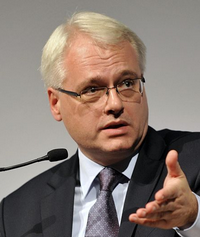ZAGREB, Croatia -- Croatian voters face a stark choice this Sunday when they go to the polls to elect a new president, between the Social Democrat, Ivo Josipovic, and the former Social Democrat and Zagreb's mayor, Milan Bandic. The outcome of the election will serve as a litmus test of the country's European aspirations, and could have an impact on regional stability.
Although the president's constitutional powers were much curtailed under incumbent, Stipe Mesic, the office still carries considerable weight, according to Josip Kregar, an independent member of the Zagreb city council. "Croatia is a young democracy and the personality of the president is still very important," Kregar explained, adding that Mesic used not only his constitutional powers, but also "the legitimacy he had as the directly elected president to support or to stop some initiatives."
Presidential influence is particularly strong in matters of foreign relations, where EU entry has been the No. 1 priority for years. But pro-Europeans worry that Croatia has recently grown disillusioned with the prize of EU membership, making the union's entry requirements a less effective means of steering the country into line with international norms. "This election is a test of the the Croatian nation: Are we really willing to choose someone, Mr. Josipovic, who symbolizes raw democratic reforms and pure European attitudes, or Mr. Bandic, who is a symbol of national isolation and patriotism?" says Kregar.

